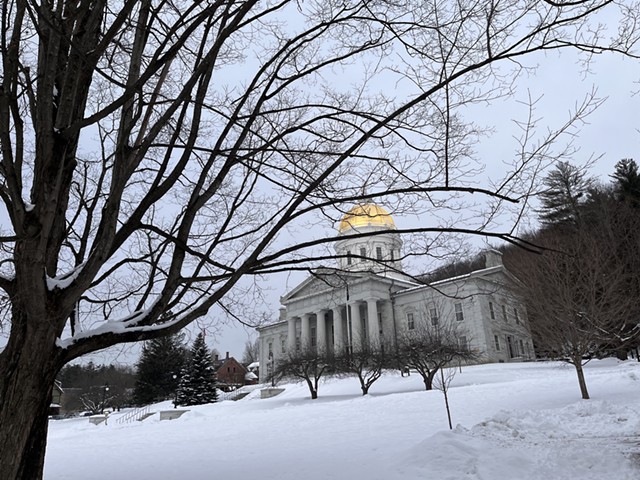
- Anne Wallace Allen ©️ Seven Days
- Vermont Statehouse
Rep. Robin Chesnut-Tangerman (D-Middletown Springs) told the House Committee on Government Operations and Military Affairs on Thursday that the bill he is cosponsoring, H.806, would restrict state funding to libraries that ban or remove library materials due to “partisan" disapproval.
“This is driven by increasing attempts to control material available in public and school libraries based on political or ideological grounds,” said Chesnut-Tangerman, one of 17 lawmakers sponsoring the proposal. H.806 also calls for libraries to establish policies for handling requests for bans.
Chesnut-Tangerman acknowledged that he doesn’t know of any books being banned in Vermont. Yet as national conservative groups seek to gain influence in all states, the bill is a preventive measure, he said.
"I don’t believe this is a solution in search of a problem,” he told the committee. “I think it’s a timely intervention.”
Book bans have become increasingly common nationally in recent years. A report from the writers’ advocacy group PEN America said more books were banned in school libraries in fall 2022 than in each of the prior two semesters. Some states have recently passed laws censoring ideas and materials in public schools, the PEN report said.
“Broad efforts to label certain books 'harmful' and 'explicit' are expanding the type of content suppressed in schools,” PEN said in a recent report. The states with the most instances of book bans last year were Texas, Florida, Missouri, Utah and South Carolina, PEN said.
Vermont librarians are taking notice. H.806 is one of a few bills introduced this year aimed at library censorship; another is S.220, a bill covering several topics that was created in response to a November report on the status of Vermont libraries. S.220 contains a section on intellectual freedom. Another bill, H.807, addresses bans at school libraries only.
Earlier this month, the governing boards of the Vermont School Library Association and the Vermont Library Association released a statement affirming intellectual freedom and welcoming the attention to the issue in the Statehouse.
“We believe all Vermonters deserve free access to materials that function as windows and mirrors, both reflecting individuals’ experiences and providing expanded, diverse views of the world,” the statement says. “We also believe that people are only truly free when they can read freely.”
Related Lt. Gov. Zuckerman Goes on a 'Banned Books Tour'

Lt. Gov. Zuckerman Goes on a 'Banned Books Tour'
Culture
“Banning books flies in the face of what education is about: teaching our children to think for themselves,” McCann said. “This bill aims to protect access to reading material that celebrates diversity, speaks truth to power and cultivates dreams.”
Rebecca Sofferman, copresident of the Vermont School Library Association and a librarian at Colchester Middle School, said well-thought-out policies help librarians react in a uniform manner to challenges from the public. Of the 290 school libraries in Vermont, she said, a 2022 audit showed that only 35 percent had updated policies for considering requests to remove books. Six libraries had no policy.
“If it’s a well-written policy and it’s up to date, it requires the person to go through a process” including speaking to the librarian and the school principal and filling out a form about the material they are objecting to, she said.
Sometimes the person seeking a ban is encouraged to read the book in question.
“Then they have a conversation, and the committee makes a recommendation about whether the book should be kept or not, and then usually the school board will make the final decision,” Sofferman said.
She added that she occasionally hears from parents who don’t want their child to read a particular book, and she always honors that request.
“We of course will abide by that, because it’s a parent advocating for their own child,” she said. “It’s when they try to remove a book so nobody can read it that they are violating the students’ First Amendment rights and their families’ decisions as well.”






Comments
Comments are closed.
From 2014-2020, Seven Days allowed readers to comment on all stories posted on our website. While we've appreciated the suggestions and insights, right now Seven Days is prioritizing our core mission — producing high-quality, responsible local journalism — over moderating online debates between readers.
To criticize, correct or praise our reporting, please send us a letter to the editor or send us a tip. We’ll check it out and report the results.
Online comments may return when we have better tech tools for managing them. Thanks for reading.